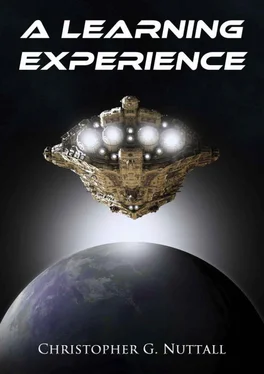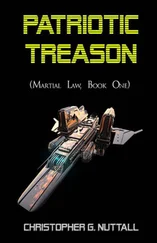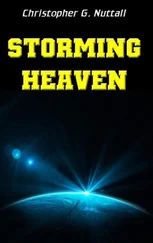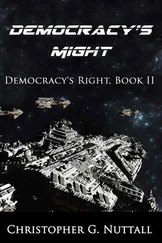The President’s daughter looked up at him, eagerly. “Are we going to see Apollo 11?”
“We are,” Steve confirmed. Had he ever been so eager as a child? Probably. “But first we have to tour the colony.”
He allowed Rochester to take the lead as they stepped through the airlock and into the rapidly-growing underground colony. It had been a month since they’d make their public debut and the response had been astonishing. The lunar population had more than quadrupled, while several new factories had been set up on the moon and more were on the way. Indeed, with another starship at their disposal, they’d even started pointing water asteroids towards Mars to start the terraforming process. The protests from environmentalists on Earth had simply been ignored.
“This is an incredible place,” the President said, as they came to the end of the tour. “You must be very proud.”
“We are, Mr. President,” Rochester said. “We’ve built quite a community here over the last two months.”
They entered Baen’s Bar and sat down at a reserved table. The owner had operated a diner in Montana Steve had patronised, but he’d gratefully moved to the moon when Steve made the offer. It was growing harder and harder to run a small business in America these days, thanks to the bureaucrats. Steve knew there would be no shortage of recruits for the foreseeable future.
“Beef, chicken and other kinds of meat are expensive up here, at the moment,” Steve explained as menus were passed round the table. “We’re still working on setting up farms for animals, so we’re having to bring it up from Earth. But, on the other hand, there are fewer overhead costs for small businessmen.”
The President laughed. “Point taken,” he said. “And retaken. And taken once again.”
Steve shrugged. “I’m afraid the food isn’t as fancy as you might get in a state dinner,” he added. “But it is very good food.”
“That will be something of a relief,” the President joked. “Do you know how difficult it can be to endure a ten-course dinner?”
The cook took their orders, then vanished behind the counter. Steve smiled to himself as the sound of frying burgers echoed over towards the table, then allowed his smile to become obvious as a young girl served the drinks. The President’s daughter had chosen a colossal milkshake, which had arrived in a weirdly-shaped glass that had been produced in zero-gravity. Unsurprisingly, the President had settled for coke.
“You’ve done quite a bit over the last month, if the reports are accurate,” the President said, as they waited. “Are you planning to slow down?”
“Not at all,” Steve said. “The first asteroid homesteading kits are being completed now, so we hope to set up the first asteroid mining stations within the next month. Despite the naysayers, we had an astonishing number of applicants volunteer to enter the training program, even though there are significant risks and a very real possibility of death millions of miles from home. And we’re placing orders for components that will be used to construct the first base on Titan…”
He smiled. “We have a very long way to go.”
The young girl returned, carrying a large tray of burgers, fries and other unhealthy foods, which she placed on the table. Steve sensed more than heard Mariko click her teeth in irritation as he took one of the burgers and started to eat it, savouring every bite. It was a genuine burger, nothing like a piece of recycled cardboard from a global fast food company. The meat blended well with the cheese, mustard and catsup. And the fries were just perfect.
“My wife is going to be irked with me,” the President observed. “I’m not supposed to eat such foods.”
“It could be worse,” Rochester said. “You could be eating recycled food.”
“Most of the bloggers on the moon seem to complain about it,” the President observed. “You’d think they’d be able to produce something that tasted good as well as provided the right nutrients.”
“Some of our people have a theory about that,” Steve said. “The whole system is designed to encourage its users to either grow foodstuffs for themselves or work out how to reprogram the system to produce something tasty. We’re working on the first option.”
“Once we have a proper farming system set up here, our food will probably taste a lot better,” Rochester agreed. “It will probably do wonders for morale too.”
After they had finished the meal — the President insisted on thanking the cook and his daughters personally — they walked back to the airlock and boarded the very first lunar hovercraft. It had been a pain to build on Earth because it was next to useless in the low gravity; eventually, once the truth had come out, the designers had promised to produce a far better version. The President’s daughter seemed to fall in love at once, running forward and sitting in the pilot’s chair. Mariko had to gently push her back towards the passenger seats, allowing Mongo to take the helm.
“This is actually a covered bus, allowing us to operate without spacesuits,” Steve explained, as Mongo started the engine. The hovercraft moved forward, balancing on a stream of gas, then inched out of the hanger. “And we added an antigravity generator, but apart from that the system is all human. We could have settled the moon years ago.”
Silence fell as the bus made its way through Heinlein Colony. There were few signs of habitation above the ground, but there were dozens of men in spacesuits and converted tractors, working to set up a mass driver. Given time, lunar rock could be shipped back to Earth for conversion into space stations — or HE3 could be shipped to Earth for the fusion power plants.
“That’s going to be the first aboveground apartment block,” Rochester said, pointing towards an excavation site. “Once its sealed, crews will install everything from plumbing to internet cables, then we’ll invite people to move into it. Half of the apartments have been marked down for long-term lunar residents, the other half will be sold to people who can support themselves on the moon.”
The President’s daughter looked up. “Could I have one?”
“Only if you come and work here,” Rochester said, not unkindly. “Or if you manage to put down the rather large sum we’re demanding from anyone who won’t be working for us.”
Steve nodded. Heinlein Colony simply couldn’t afford freeloaders. People who could work anywhere — authors, artists, consulting technicians — could settle on the moon, even if they weren’t working for the colony. Or people who were prepared to pay the down sum. But someone who couldn’t work, or wouldn’t work… it was going to be a right little headache for quite some time to come.
“I will,” the President’s daughter said, firmly.
The President and Steve exchanged glances. Having the President’s daughter on the moon would be one hell of a publicity coup — and a practical nightmare. She was young enough to adapt, presumably bright enough to learn to live on the moon… but if it became public, it would be extremely difficult for her. If nothing else, she’d be yelled at by men and women who disliked her father’s politics.
“We shall see,” the President said.
We should slip a bug into that conversation , the mischievous part of Steve’s mind commented. And see precisely how that goes .
He pushed the thought aside as the President looked over at Mariko. “I understand that you will be leading the medical teams?”
“I will,” Mariko said. “Now the whining has come to an end, that is.”
Steve winced. Mariko had been quietly furious about the endless series of delays, caused by her fellow doctors. The American Medical Association had filed complaint after complaint, questioning everything from the true nature of alien technology to the credentials of Mariko and her fellow doctors, even though the alien technology did all of the work. In the end, the AMA had only relaxed its opposition after it became clear that it was costing them politically and public opinion was turning against them.
Читать дальше












